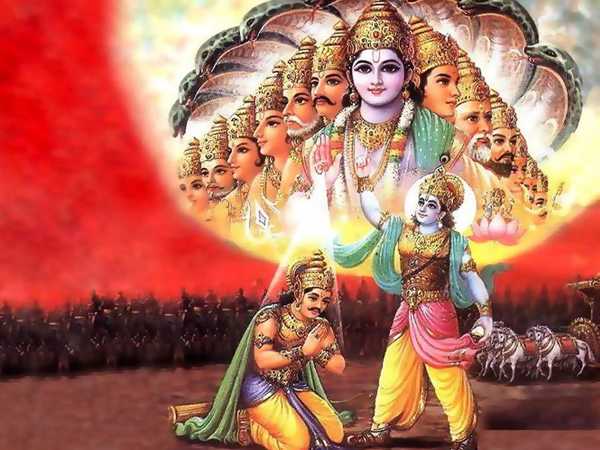Chapter 8

“Samvarta said, “There is a peak named Munjaban on the summits of theHimalaya mountains, where the adorable Lord of Uma (Mahadeva) isconstantly engaged in austere devotional exercises. There the mighty andworshipful god of great puissance, accompanied by his consort Uma, andarmed with his trident, surrounded by wild goblins of many sorts,pursuing his random wish or fancy, constantly resides in the shade ofgiant forest trees, or in the caves, or on the rugged peaks of the greatmountain. And there the Rudras, the Saddhyas, Viswedevas, the Vasus,Yama, Varuna, and Kuvera with all his attendants, and the spirits andgoblins, and the two Aswins, the Gandharvas, the Apsaras, the Yakshas, asalso the celestial sages, the Sun-gods, as well as the gods presidingover the winds, and evil spirits of all sorts, worship the high-souledlord of Uma, possessed of diverse characteristics. And there, O king, theadorable god sports with the wild and playful followers of Kuvera,possessed of weird and ghostly appearances. Glowing with its ownsplendour, that mountain looks resplendent as the morning sun. And nocreature with his natural eyes made of flesh, can ever ascertain itsshape or configuration, and neither heat nor cold prevails there, nordoth the sun shine nor do the winds blow. And, O king, neither dothsenility nor hunger, nor thirst, nor death, nor fear afflict any one atthat place. And, O foremost of conquerors, on all sides of that mountain,there exist mines of gold, resplendent as the rays of the sun. And Oking, the attendants of Kuvera, desirous of doing good to him, protectthese mines of gold from intruders, with uplifted arms. Hie thee thither,and appease that adorable god who is known by the names of Sarva, Bedha,Rudra, Sitikantha, Surapa, Suvarcha, Kapardi, Karala, Haryyaksha, Varada,Tryaksha, Pushnodantabhid, Vamana, Siva, Yamya, Avyaktarupa, Sadvritta,Sankara, Kshemya, Harikesa, Sthanu, Purusha, Harinetra, Munda, Krishna,Uttarana, Bhaskara, Sutirtha, Devadeva, Ranha, Ushnishi, Suvaktra,Sahasraksha, Midhvan, Girisa, Prasanta, Yata, Chiravasa, Vilwadanda,Siddha, Sarvadandadhara, Mriga, Vyadha, Mahan, Dhanesa, Bhava, Vara,Somavaktra, Siddhamantra, Chakshu, Hiranyavahu, Ugra, Dikpati, Lelihana,Goshtha, Shiddhamantra, Vrishnu, Pasupati, Bhutapati, Vrisha,Matribhakta, Senani, Madhyama, Sruvahasta, Yati, Dhanwi, Bhargava, Aja,Krishnanetra, Virupaksha, Tikshnadanshtra, Tikshna, Vaiswanaramukha,Mahadyuti, Ananga, Sarva, Dikpati, Bilohita, Dipta, Diptaksha, Mahauja,Vasuretas, Suvapu, Prithu, Kritivasa, Kapalmali, Suvarnamukuta, Mahadeva,Krishna, Tryamvaka, Anagha, Krodhana, Nrisansa, Mridu, Vahusali, Dandi,Taptatapa, Akrurakarma, Sahasrasira, Sahasra-charana, Swadha-swarupa,Vahurupa, Danshtri, Pinaki, Mahadeva, Mahayogi, Avyaya, Trisulahasta,Varada, Tryamvaka, Bhuvaneswara, Tripuraghna, Trinayana, Trilokesa,Mahanja, Sarvabhuta-prabhava, Sarvabhuta-dharana, Dharanidhara, Isana,Sankara, Sarva, Siva, Visveswara, Bhava, Umapati, Pasupati, Viswarupa,Maheswara, Virupaksha, Dasabhuja, Vrishavadhwaja, Ugra, Sthanu, Siva,Rudra, Sarva, Girisa, Iswara, Sitakantha, Aja, Sukra, Prithu, Prithuhara,Vara, Viswarupa, Virupaksha, Vahurupa, Umapati, Anangangahara, Hara,Saranya, Mahadeva, Chaturmukha. There bowing unto that deity, must thoucrave his protection. And thus, O prince, making thy submission to thathigh-souled Mahadeva of great energy, shalt thou acquire that gold. Andthe men who go there thus, succeed in obtaining the gold. Thusinstructed, Marutta, the son of Karandhama, did as he was advised. Andmade superhuman arrangements for the performance of his sacrifice. Andartisans manufactured vessels of gold for that sacrifice. And Vrihaspatitoo, hearing of the prosperity of Marutta, eclipsing that of the gods,became greatly grieved at heart, and distressed at the thought that hisrival Samvarta should become prosperous, became sick at heart, and theglow of his complexion left him, and his frame became emaciated. And whenthe lord of the gods came to know that Vrihaspati was much aggrieved, hewent to him attended by the Immortals and addressed him thus.”




